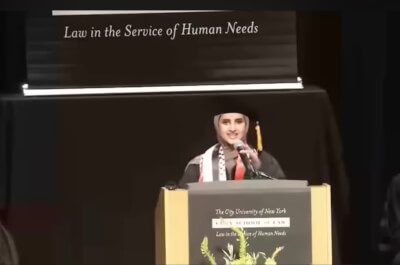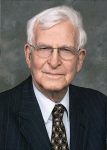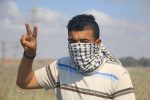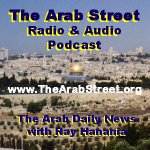Confronting Iran cornerstone to confronting extremism
Iran is the cornerstone of increasing extremism in the Middle East and the failure of the Arab World to unite to confront Israeli atrocities. Palestine won’t be free until extremism and extremists are destroyed.
By Ray Hanania
Arab News, Dec. 21, 2017 – In his National Security and Defense speech Monday, U.S. President Donald Trump put Iran and North Korea in the crosshairs of a new more aggressive foreign policy to confront extremism and terrorism.
Trump said he visited 13 foreign countries citing meetings in Saudi Arabia, where he is reinforcing relations, and South Korea, which he called “the seat of Democracy” on the Korean peninsula.
As he approaches his first anniversary in office, Trump is energized with a big win pushing a new tax reform plan through Congress giving him the encouragement to be more aggressive in taking on more challenges and correcting “the failures of the past.”

That strategy is clear. By confronting Iran, the network of extremism in the Middle East and Asia can be weakened and controlled. It also puts him in clear contrast to his predecessor President Barack Obama.
“They neglected a nuclear menace in North Korea; made a disastrous, weak, and incomprehensibly bad deal with Iran; and allowed terrorists such as ISIS to gain control of vast parts of territory all across the Middle East,” Trump said.
This is good news for the Arab nations that are pushing a moderate vision to confront religious and political extremism, and the nations that empower that extremism.
Obama based much of his policy believing that a shift in Iran’s government to a “moderate centrist,” the election of Hassan Rouhani as president in 2013, could be nurtured to spread moderation. Obama pushed through a deal with Iran to help ease sanctions and give Iran’s leadership relief from the worldwide embargo.
Yet, since 2013, Iran’s role in supporting extremism has grown and not subsided.
To demonstrate his sincerity, Obama even ordered the U.S. Drug Enforcement Agency (DEA) to stop pursuing allegations that Hezbollah was using drug sales to purchase weapons and rockets. The DEA plan was nicknamed Operation Cassandra and was how profits from the sale of drugs were being used by Hezbollah, a key Iranian ally, to purchased weaponry.
Obama did not want to rock the boat with Iran.
Obama believed that by bringing tensions with Iran down, he could undermine the advances of Daesh and other extremist terrorist groups in the Middle, achieving some semblance of stability.
But appeasement of extremists like Iran doesn’t work.
For all the criticism he receives in the mainstream American news media, Trump is proving to be the stronger ally for Middle East moderation.
That means putting Iran in check, not negotiating deals that can’t be enforced. It means exposing Hezbollah’s hypocrisy, selling drugs to raise funds to purchase weaponry.
Trump’s policy on Syria has reversed from militarily confronting the Syrian dictatorship, to undermine Syria’s support from Iran and Hezbollah.
The reversal in policy is working, Trump claims.
“Following my trip to the Middle East, the Gulf states and other Muslim-majority nations joined together to fight radical Islamist ideology and terrorist financing,” Trump said during his speech Monday to a audience at the Ronald Reagan Building and International Trade Center
“We have dealt ISIS one devastating defeat after another. The coalition to defeat ISIS has now recaptured almost 100 percent of the land once held by these terrorists in Iraq and Syria. Great job. (Applause.) Great job. Really good. Thank you. Thank you. We have a great military. We’re now chasing them wherever they flee, and we will not let them into the United States.”
Trump refused to certify the agreement worked out by Obama and Iran, which puts that deal in jeopardy.
What America must do to confront extremism and terrorism is not to coddle or appease Iran, not to turn its back on Hezbollah’s sinister strategies on drugs and violence, and not to pretend that this coalition of fanaticism can change its inherent nature.
To defeat terrorism, we must fight the enablers of terrorism and undermine their network which fuels extremism in Syria, Yemen and even in Qatar.
Trump isn’t allowing words or rhetoric to stand in the way of his plans, repeating a phrase that Obama was pressured to avoid in his foreign policy statements, “radical Islamic terrorism.”
Trump stressed, “Our strategy calls for us to confront, discredit, and defeat radical Islamic terrorism and ideology and to prevent it from spreading into the United States.”
Qatar’s media propaganda arm has led the way in branding the phrase “radical Islamic terrorism” to represent an anti-Muslim strategy. But it’s not. Trump has made it clear he will work with many of the Muslim and Arab World’s moderate leadership and that he distinguishes between moderate Islam and religious fanatics who distort the fundamentals of Islam.
Using the term is bad news for Iran, for Hezbollah, for Qatar and its satellite news agency, and for Iran’s client, Syria.
It’s also bad news for the mercurial leader Kim Jong Un in North Korea, the tyrant who feeds off of the Middle East extremism to embolden his own aggressive rhetoric and world threats.
Pulling the rug out from under Iran will have a wider positive impact throughout the world in undermining terrorism, extremism and possibly restoring hope for Middle East peace.
(Ray Hanania is an award winning Palestinian American columnist, author and former Chicago City Hall political reporter. Email him at rghanania@gmail.com.)


- Israelisnipers shooting and killing hospital workers in Gaza - December 11, 2023
- CAIR Condemns Israeli Executions of Wounded, Unarmed Palestinian in West Bank - December 11, 2023
- Arab and Muslim American voters face a “simple choice” between Biden’s inhumanity and Trump’s edgy politics - December 9, 2023
























